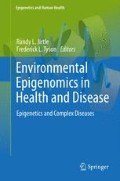Abstract
Epigenetics raises important legal and ethical issues that have been largely unexplored. Initially, this chapter considers whether legal and ethical issues raised by epigenetics differ from those raised by genetics, about which there already has been much discussion and legislation. Among the key differences are the higher rates of epigenetic marks than genetic mutations from similar environmental exposures and the greater potential for multigenerational harms caused by epigenetics. This chapter discusses the following legal issues: (1) regulation of research, (2) regulation of exposures, (3) discrimination, (4) personal injury litigation, and (5) medical malpractice. The ethical issues discussed are (1) environmental and occupational justice, (2) personal responsibility, (3) privacy and confidentiality, (4) access to healthcare, (5) equality, and (6) intergenerational equity. In general, this chapter discusses how epigenetics raises fundamental issues in a new context, thereby challenging existing legal and ethical doctrines.
Access this chapter
Tax calculation will be finalised at checkout
Purchases are for personal use only
References
Agency for Toxic Substances and Disease Registry (2011) Case studies in environmental medicine – benzene toxicity – physiologic effects. Available at www.atsdr.cdc.gov/csem/benzene/physiologic_effects.html. Last accessed 11 Mar 2011
Carruth RS, Goldstein BD (2001) Relative risk greater than two in proof of causation in toxic tort litigation. Jurimetrics 41:195–209
Disability Rights Education and Defense Fund (2011) Country laws index. Available at http://www.dredf.org/international/lawindex.shtml. Last accessed 11 Mar 2011
Dierickx K, Borry P eds. (2009) New challenges for biobanks: ethics, law and governance. Intersentia, Antwerp, Belgium
Dolinoy DC, Weidman JR, Jirtle RL (2007) Epigenetic gene regulation: linking early developmental environment to adult disease. Reprod Toxicol 23:297–307
Eiseman E, Haga SB (1999) Handbook of human tissue sources: a national resource of human tissue samples. RAND, Rockville
Federal Policy for the Protection of Human Subjects (2011) 45 C.F.R. Part 46
Golle P (2006) Revisiting the uniqueness of simple demographics in the U.S. population. In Workshop on privacy in the electronic society. Association for Computing Machinery, New York. Available at www.trustee.org/wise/articles2009/article M3.pdf. Last accessed 14 Mar 2011
Hellman D (2003) What makes genetic discrimination exceptional? Am J Law Med 29:77–116
Hull SC et al (2008) Patients’ views on identifiability of samples and informed consent for genetic research. Am J Bioeth 8:62–70
Jirtle RL, Skinner MK (2007) Environmental epigenomics and disease susceptibility. Nat Rev Genet 8:253–262
Kaati G et al (2002) Cardiovascular and diabetes mortality determined by nutrition during parents’ and grandparents’ slow growth period. Eur J Hum Genet 10:682–688
Knoppers BM (2005) Biobanking: international norms. J Law Med Ethics 33:7–14
Melo-Martin I (2008) A duty to participate in research: does social context matter? Am J Bioeth 8:28–36
Pembrey ME (1996) Imprinting and transgenerational modulation of gene expression; human growth as a model. Acta Genet Med Gemellol (Roma) 45:111–125
Rawls J (1971) A theory of justice. Belknap Press of Harvard University, Cambridge, MA
Rothstein MA (2005a) Genetic exceptionalism and legislative pragmatism. Hastings Cent Rep 35(4):27–33
Rothstein MA (2005b) Expanding the ethical analysis of biobanks. J Law Med Ethics 33:89–101
Rothstein MA (2007) Legal conceptions of equality in the genomic age. Law Inequal 25:429–463
Rothstein MA (2010a) Is deidentification sufficient to protect health privacy in research? Am J Bioeth 10:3–11
Rothstein MA (2010b) Health care reform and medical malpractice claims. J Law Med Ethics 38:871–874
Rothstein MA (2010c) The Hippocratic bargain and health information technology. J Law Med Ethics 38:7–13
Rothstein MA, Anderlik M (2001) What is genetic discrimination and when and how can it be prevented? Genet Med 3:354–358
Rothstein MA et al (2009) The ghost in our genes: legal and ethical implications of epigenetics. Health Matrix 19:1–62
Swede H, Stone CL, Norwood AR (2007) National population-based biobanks for genetic research. Genet Med 9:141–149
Sweeney L (2002) K-anonymity: a model for protecting privacy. Int J Uncertain Fuzz Knowl Base Syst 10:557–570
World Medical Association (2000) Declaration of Helsinki. Available at http://ohsr.od.nih.gov/guidelines/helsinki.html. Last accessed 11 Mar 2011
Author information
Authors and Affiliations
Corresponding author
Editor information
Editors and Affiliations
Rights and permissions
Copyright information
© 2013 Springer-Verlag Berlin Heidelberg
About this chapter
Cite this chapter
Rothstein, M.A. (2013). Legal and Ethical Implications of Epigenetics. In: Jirtle, R., Tyson, F. (eds) Environmental Epigenomics in Health and Disease. Epigenetics and Human Health. Springer, Berlin, Heidelberg. https://doi.org/10.1007/978-3-642-36827-1_14
Download citation
DOI: https://doi.org/10.1007/978-3-642-36827-1_14
Published:
Publisher Name: Springer, Berlin, Heidelberg
Print ISBN: 978-3-642-36826-4
Online ISBN: 978-3-642-36827-1
eBook Packages: Biomedical and Life SciencesBiomedical and Life Sciences (R0)

